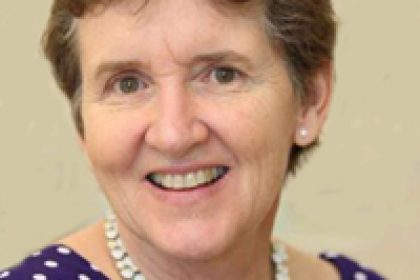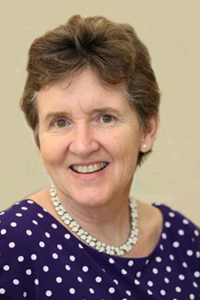
 Joanne Burke, Ph.D., RD, LD, is the Thomas W. Haas Professor of Sustainable Food Systems at the UNH Sustainability Institute and member of the Backbone Team for Food Solutions New England. As a Clinical Associate Professor in the Department of Molecular, Cellular, and Biomedical Sciences (UNH College of Life Sciences & Agriculture), she is Director of the UNH Dietetic Internship Program and a teaching faculty member in the Nutrition Program. Dr. Burke advances activities across curriculum, operations, research, and engagement in sustainable food systems at UNH and via state and regional initiatives. Her scholarship focuses on food system planning, with a special emphasis on the role of race, socio-economic status, and food security and their impacts on food access, nutrition, and health status.
Joanne Burke, Ph.D., RD, LD, is the Thomas W. Haas Professor of Sustainable Food Systems at the UNH Sustainability Institute and member of the Backbone Team for Food Solutions New England. As a Clinical Associate Professor in the Department of Molecular, Cellular, and Biomedical Sciences (UNH College of Life Sciences & Agriculture), she is Director of the UNH Dietetic Internship Program and a teaching faculty member in the Nutrition Program. Dr. Burke advances activities across curriculum, operations, research, and engagement in sustainable food systems at UNH and via state and regional initiatives. Her scholarship focuses on food system planning, with a special emphasis on the role of race, socio-economic status, and food security and their impacts on food access, nutrition, and health status.
Why do you do what you do?
I very much enjoy nutrition because it’s a profession and a passion that intersects with so many parts of our lives – social justice, the impact of healthy eating on the health of our bodies, the pleasure of eating together. The need for food unites us all – it’s something everyone experiences. To me one of the big challenges is that we all need food, but not everyone can access food. This is a solvable problem if we have the collective will to comprehensively address the structural causes of hunger and food insecurity in our county. As an individual who’s had the privilege of higher education and never experienced persistent hunger, to think that children can’t reach their full potential or that there are about 1 in 6 Americans (many of them children) who don’t routinely have access to healthy food is distressing and indeed shameful.
What motivates you?
Food can make a powerful difference in the lives of individuals and communities. I find it rewarding to contribute to going beyond the symptoms by lifting up systemic issues that contribute to food insecurity. Often at the federal level, the question of food insecurity focuses on how many people are hungry and what food assistance programs should do in response. This approach accepts the prevalence of hunger and poverty when the real questions should be why are so many people suffering from food insecurity and what are the structural changes needed to reverse this trend?
Working as part of the UNH Sustainability Institute and the Food Solutions New England network gives me the opportunity to learn from others, and to help shape the direction we’re going. Just because a lot of people are concerned about their food doesn’t mean there will be changes in policy and practices that promote greater access to more livable wage jobs for all Americans. At the end of the day, you hope in your lifetime you’ve made a positive difference, and I hope the work we are engaged in makes a difference for this generation and for generations to come.
What are your most urgent concerns or upcoming action opportunities?
- The US Dietary Guidelines final draft is being reviewed. Chapter 5 of the Dietary Guidelines Advisory Committee’s February 2015 Scientific Report calls for the Guidelines to reflect a commitment to promoting food system sustainability and safety. However, some meat industry groups and members of the USDA feel that consideration of sustainability is beyond the scope of the Guidelines. The comment period is open until May 8 – submit your comment on why keeping these sustainability guidelines are essential for food system viability.
- With the new Congress, calls for additional SNAP cuts are reprehensible since SNAP benefits aren’t able to meet monthly food needs. Sign the Food Research Action Center’s petition in support of SNAP.
- In New Hampshire, we have made important strides in coming together as a statewide network. I am very energized about the momentum of our NH Food Alliance network and food system strategy work.
- Food Solutions New England’s emerging work on race and equity continues to call the network to make a greater commitment to growing our individual and collective capacity to address food system inequities.
How can the FSNE Network help you overcome or address those concerns or help you with the action?
Through collaborative efforts, brainstorming, growing understanding and channeling our collective will, FSNE is lifting up and addressing critical food system issues. The network approach emphasizes collective impact – we’re better together. From the first summit in 2011, we realized we have clout in numbers and expertise. We’ve built new professional and personal relationships and reached out to people for resources, stories, and intellectual and emotional power, calling on network participants to ask what they think and how they’re responding to various issues. The network offers professional, intellectual, and emotional support. This helps to recharge batteries, knowing we’re working together to affect positive change.
“A social movement that only moves people is merely a revolt. A movement that changes both people and institutions is a revolution.”
― Martin Luther King Jr., Why We Can’t Wait



